Battle for the fate of the Iran nuclear deal begins
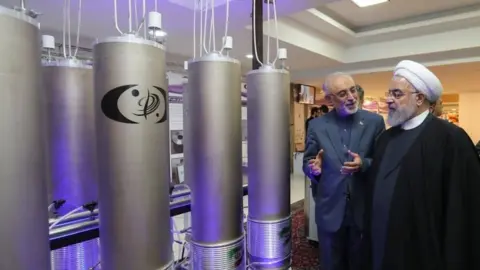 AFP
AFPThe real battle for the fate of the Iran nuclear deal has begun.
For a year now since the Trump administration unilaterally withdrew from the agreement, a kind of "phoney diplomatic war" has been under way.
Iran and all the other parties to the accord have carried on regardless of Washington's actions.
Indeed, the International Atomic Energy Agency, the global nuclear watchdog, has repeatedly given Tehran a clean bill of health. Iran has been living up to its part of the bargain.
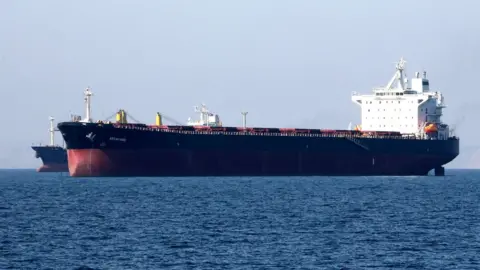 AFP
AFPBut Iranian compliance was not the issue for the Trump administration.
It just believes that this is a very bad deal. Its main European allies, along with Russia and China, disagree.
So the Trump administration has been ratcheting up the pressure on Tehran.
It has re-imposed many sanctions; it has designated the Islamic Revolution Guards Corps (IRGC) as a terrorist organisation; and, most recently, it has not renewed sanctions waivers that allowed several countries to continue purchasing Iranian oil.
The pressure on Iran's economy has been severe.
Both in terms of responding to popular pressure at home and in an effort to relieve its worsening situation, the Iranian government has now decided to act.

It has taken the first anniversary of the US withdrawal from the agreement - known as the Joint Comprehensive Plan of Action (JCPOA) - to start setting conditions of its own.
Iran is pursuing what it sees as a deliberate and measured course.
First, it says it is no longer going to respect restrictions on storing enriched uranium and heavy water.
And it has given a 60-day deadline to the remaining countries involved in the JCPOA to implement what Iran calls "their commitments", particularly in the banking and oil sectors.
If this deadline passes, then Iran will suspend restrictions on the level of enrichment it is allowed to conduct and halt the modernisation of the Arak heavy-water reactor.
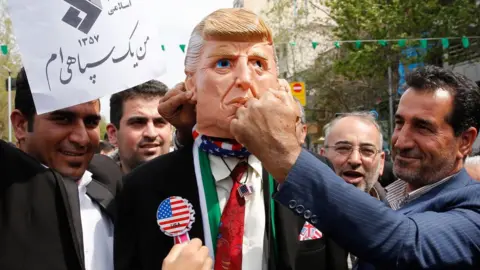 AFP
AFPIran is presenting itself very much as the wronged party, forced to act by unrelenting US pressure. And, if you ignore wider concerns about Iran's regional behaviour or its missile programmes - which, to be fair were never part of the JCPOA - it has a point.
It has broadly stuck to the letter of the agreement. US sanctions that were supposed to be lifted have been reimposed. Its economy is suffering badly. Tehran is saying "enough is enough".
The pressure now is squarely upon the Europeans - in particular the French, the British and German governments which helped to negotiate the deal.
Iran is charging them with not having lived up to their promises.
They have to do something to relieve the economic pressure on Tehran or, after 60 days, it will move to stage two of its planned suspensions.
And there is an explicit warning to the Europeans too.
Iran's President, Hassan Rouhani, has underlined his country's role in fighting the smuggling of drugs and in constraining the flow of refugees into Europe. US economic pressure, he insists, means that Iran could no longer afford such activities.
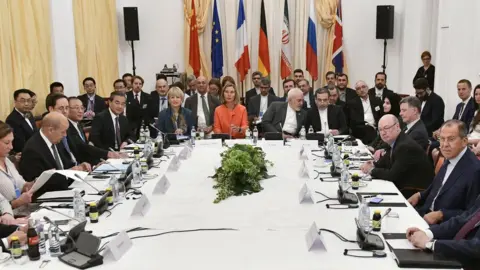 AFP
AFPSo what can the Europeans do?
They have created an elaborate mechanism to facilitate trade with Iran. But it is unclear how effective this has been.
Many companies with an international profile would prefer to avoid the risks and choose trade with the US over Iran.
European governments are in a double-bind.
Relations with Washington have already been soured by this issue. The US wants the JCPOA gone and it is hard to see how the Europeans can do enough by themselves to satisfy Iran to save it.
But equally the Europeans, in wanting the nuclear deal to survive, cannot allow Iran to remain in breach of its terms.
So a difficult couple of months of diplomacy lie ahead.
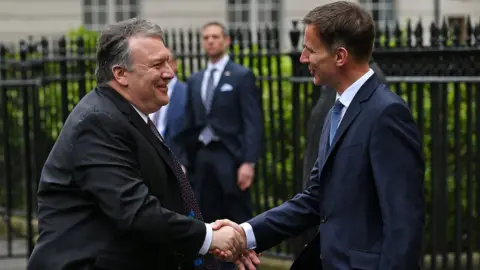 AFP
AFPUnless there is a fudge, it is hard to see the JCPOA surviving.
The Europeans need to craft some modest understanding that gives Tehran the opportunity to back down and return to full compliance. It cannot be only partly in the JCPOA deal. Washington's unilateral rejection of it at least had the benefit of clarity.
Russia and China were also key backers of the JCPOA.
They too have a diplomatic part to play, but Washington's position is inevitably causing additional tensions with Moscow and Beijing. Both governments have laid the blame for the JCPOA's problems squarely at Washington's door.
The Trump administration must see its ultimate goal - the collapse of the JCPOA - as now being in sight.
It will also be applying huge pressure on its European partners who are caught between a rock and a hard place.
The Europeans are to some extent ambivalent because they too are concerned about Iran's foreign policy, its support for terrorism, and its missile and missile-export programmes.
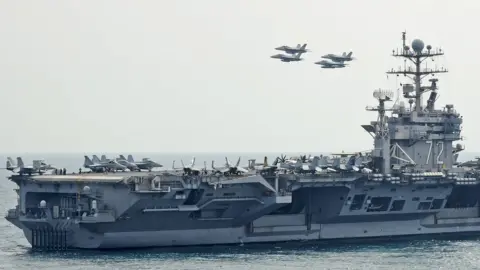 EPA
EPAThis is the context in which tensions are rising.
US military warnings are intended to send an unequivocal message that any anti-US actions by Iran or its proxies will have only one return address - Tehran.
Is Washington gearing up for a war? Not yet.
But the logic of the Trump administration's policy is unforgiving - either Iran radically changes its behaviour, or the US will do as much as it can to bring the Iranian regime down.
The danger of conflict - albeit by accident rather than design - is growing.
And the collapse of the JCPOA will be another step on the escalatory ladder.
